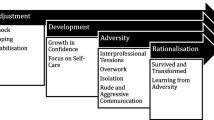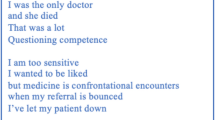Abstract
This manuscript discusses two extant theories that are pertinent to retaining new graduate nurses in practice and applies the new theory of reciprocal role modelling to them. Transition shock was first postulated by Boychuk Duchscher, who theorised that the real life world of clinical practice was so far removed from a nurse’s educational preparation in College or University that it caused the attrition of some nurses from the profession. In addition, Chambliss described the process of routinisation into hospital life and nursing work in his book Beyond caring, which was the result of 15 years of ethnographic observation in a hospital. Some nurses never become routinised to nurses’ work. Both of these theories support the grounded theory of reciprocal role modelling, that describes how new graduate nurses are mentored by experienced practice nurses (EPNs) into general practice in New Zealand. Unexpectedly new graduate nurses become role models to the EPNs showing them how to access information and continuing professional development material using modern technology. Acknowledging transition shock and the concept of routinisation and providing an environment in health-care organisations where reciprocal role modelling can occur, may result in the retention of younger nurses in the workforce.
Similar content being viewed by others
References
Beecroft, P.C., Dorey, F. and Wenten, M. (2008) Turnover intention in new graduate nurses: A multivariate analysis. Journal of Advanced Nursing 62: 41–52.
Birks, M. and Mills, J. (2011) Grounded Theory. A Practical Guide. London: Sage Publications.
Boychuk Duchscher, J. (2001) Out in the real world: Newly graduated nurses in acute-care speak out. Journal of Nursing Administration 31 (9): 426–439.
Boychuk Duchscher, J. (2009) Transition shock: The initial stage of role adaptation for newly graduated registered nurses. Journal of Advanced Nursing 65 (5): 1103–1113.
Boychuk Duchscher, J. and Cowin, L. (2004) The experience of marginalization in new nursing graduates. Nursing Outlook 52 (6): 289–296.
Chambers, P.D. (2010) Tap the unique strengths of the millennial generation. Nursing 40 (2): 48–51.
Chambliss, D. (1996) Beyond Caring: Hospitals, Nurses and the Social Organization of Ethics. Chicago, IL: The University of Chicago Press.
Charmaz, K. (2014) Constructing Grounded Theory. London: Sage Publications.
Dols, J., Landrum, P. and Wieck, K. (2010) Leading and managing an intergenerational workforce. Creative Nursing 16 (2): 68–74.
Earle, V. and Myrick, F. (2009) Nursing pedagogy and the intergenerational discourse. Journal of Nursing Education 48 (11): 624–630.
Hayes, L. et al (2012) Nurse turnover: A literature review–an update. International Journal of Nursing Studies 49 (7): 887–905.
Hoare, K., Buetow, S., Francis, K. and Mills, J. (2012a) Using an emic and ethnographic technique in a grounded theory study of information use by practice nurses in New Zealand. Journal of Research in Nursing 18 (8): 720–731.
Hoare, K., Millls, J. and Francis, K. (2012b) Becoming willing to role model: Reciprocity between new graduate nurses and experienced practice nurses in general practice in New Zealand: A constructivist grounded theory. Collegian 20 (2): 87–93.
Hoare, K.J., Mills, J. and Francis, K. (2013) New graduate nurses as knowledge brokers in general practice in New Zealand: A constructivist grounded theory. Health & Social Care in The Community 21 (4): 423–431.
Hu, J., Herrick, C. and Hodgin, K. (2004) Managing the multigenerational nursing team. Health Care Manager 23 (4): 334–340.
Huntington, A., Gilmour, J., Tuckett, A., Neville, S., Wilson, D. and Turner, C. (2011) Is anybody listening? A qualitative study of nurses’ reflections on practice. Journal of Clinical Nursing 20 (9–10): 1413–1422.
Kramer, M. (1974) Reality Shock. Why Nurses Leave Nursing. St Louis, MO: Mosby.
Leiter, M., Price, S. and Spence Laschinger, H. (2010) Generational differences in distress, attitudes and incivility among nurses. Journal of Nursing Management 18 (8): 970–980.
Mills, J. (2009) The trajectory of cultivating and growing Australian rural nurses: Findings from a constructivist grounded theory. Social Theory & Health 7 (1): 39–54.
Mills, J., Francis, K. and Bonner, A. (2008a) Getting to know a stranger – Rural nurses’ experiences of mentoring: A grounded theory. International Journal of Nursing Studies 45 (4): 599–607.
Mills, J., Francis, K. and Bonner, A. (2008b) Walking with another: Rural nurses’ experiences of mentoring. Journal of Research in Nursing 13 (1): 23–35.
North, N. (2011) Can New Zealand achieve self-sufficiency in its nursing workforce? Journal of Clinical Nursing 20 (1/2): 40–49.
Nursing Council of New Zealand. (2014) The New Zealand Nursing Workforce. Wellington, New Zealand: Nursing Council of New Zealand.
Olson, M.E. (2009) The ‘Millenials’: First year in practice. Nursing Outlook 57 (1): 10–17.
Phillips, C., Kenny, A., Esterman, A. and Smith, C. (2014) A secondary data analysis examining the needs of graduate nurses in their transition to a new role. Nurse Education in Practice 14 (2): 106–111.
Stanley, D. (2010) Multigenerational workforce issues and their implications for leadership in nursing. Journal of Nursing Management 18 (7): 846–852.
Strauss, W. and Howe, N. (1991) Generations: The History of America’s Future 1584 to 2069. New York: William Morrow & Company.
Stuenkel, D. and Cohen, J. (2005) Work force issues. The multigenerational nursing work force: Essential differences in perception of work environment. Journal of Nursing Administration 35 (6): 283–285.
Stuenkel, D., Cuesta de la, K. and Cohen, J. (2005) The multigenerational nursing workforce: Essential differences in perception of work environment. Journal of Nursing Administration 35 (6): 283–285.
Timmermans, S. and Tavory, I. (2007) Advancing ethnographic research through grounded theory practice. In: A. Bryant and K. Charmaz (eds.) The Sage Handbook of Grounded Theory. London: Sage Publications.
Wilson, B., Squires, M., Widger, K., Cranley, L. and Tourangeau, A. (2008) Job satisfaction among a multigenerational nursing workforce. Journal of Nursing Management 16 (6): 716–723.
World Health Organisation. (2006) The World Health Report 2006: Working Together for Health, Geneva. World Health Organisation.
Zemke, R., Raines, C. and Filipczak, B. (2000) Generations at Work: Managing the Clash of Veterans, Boomers, Xers and Nexters in Your Workplace. New York: Amacom.
Author information
Authors and Affiliations
Rights and permissions
About this article
Cite this article
Hoare, K. Retaining new graduate nurses in practice; under-pinning the theory of reciprocal role modelling with ‘routinisation’ theory and transition shock. Soc Theory Health 14, 224–238 (2016). https://doi.org/10.1057/sth.2015.30
Published:
Issue Date:
DOI: https://doi.org/10.1057/sth.2015.30




